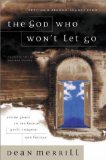The God Who Won’t Let Go. By Dean Merrill. Grand Rapids, MI: Zondervan, 1998. 158 pp. Paper, $11.00.
Merrill has written a compelling Christian-living book that unveils divine grace in the face of guilt, tragedy, and failure. This work accomplishes its solitary aim: to overwhelm the reader with the unconditional forgiveness of God. However, this is not a book that pertains to salvation, but service. As Merrill states, “The good news to adults who have made a major mistake in their lives is this: It’s okay to run to your Father” (p. 15, italics original). In this short, easy-to-read book, Merrill chronicles several biblical personalities who struggled and overcame sin. He then follows up his biblical case studies with several “profiles” that demonstrate how God believes in second chances.
The book contains four parts. Part One is called “The Return of Confidence” (pp. 13-42). The first biblical illustration in this section is John Mark (pp. 21-24) and the second is Jonathan (pp. 24-26). This section focuses on the God of the second chance who gives hope to His children.
The second part is called “The Need for Confrontation” (pp. 47-82). In this section, the biblical illustrations include Jonah, Jacob, and Moses. In his consideration of confrontation, Merrill observes that “God is wise enough to know that pain is the greatest motivator to change….People change faster when they hurt than under almost any other condition” (p. 49).
The third part is called “The Fruits of Confession” (pp. 47-82). In this section, David is the biblical illustration. The focus is to help those who have fallen deal with their memories (pp.75-82) and exhibit fruits of confession (pp. 87-95). Merrill writes, “Fallen Christians are sometimes not sure about this [does God forgive totally?]. Can God really forgive as completely now as when we first came to him for salvation? Doesn’t He keep some sort of blacklist?” (p. 91). Merrill responds with grace sharing the following passages: Jeremiah 31:34; Ps 103:12; and Eph 1:7-8.
The final part is called “Moving On” (pp. 111-53). In this section, Abraham serves as the biblical illustration. The book closes by emphasizing God’s supernatural ability to make “new things” (pp. 113-18) out of the old mess of our sin. The result is that those who have fallen are capable of becoming “conquerors” (pp. 121-28).
Merrill is an excellent writer. He is the author or co-author of numerous books (e.g., he co-wrote Fresh Wind, Fresh Fire and Fresh Faith with Jim Cymbala). He has also served as an editor for four major Christian periodicals. However, it must be stated that while this book is compelling, it is biblically uninformative. The eight profiles that Merrill includes take up approximately half of his book. Although they are intriguing, this reviewer was interested in more biblical and practical content. Fortunately, Merrill provides a “For Your Reflection” section that closes each chapter providing plenty of Scriptures for the interested reader to look up.
Merrill capably demonstrates that God can and will forgive. He also illustrates that God can and will restore a life to usefulness once again. JOTGES readers will find this book profitable. It is also likely that many will find it challenging. This writer believes that it is critical to be grace-oriented as it pertains to salvation, but it is also important to be grace-oriented as it relates to sanctification and service.
Pastor Keith R. Krell
Emmanuel Baptist Church
Olympia, WA

